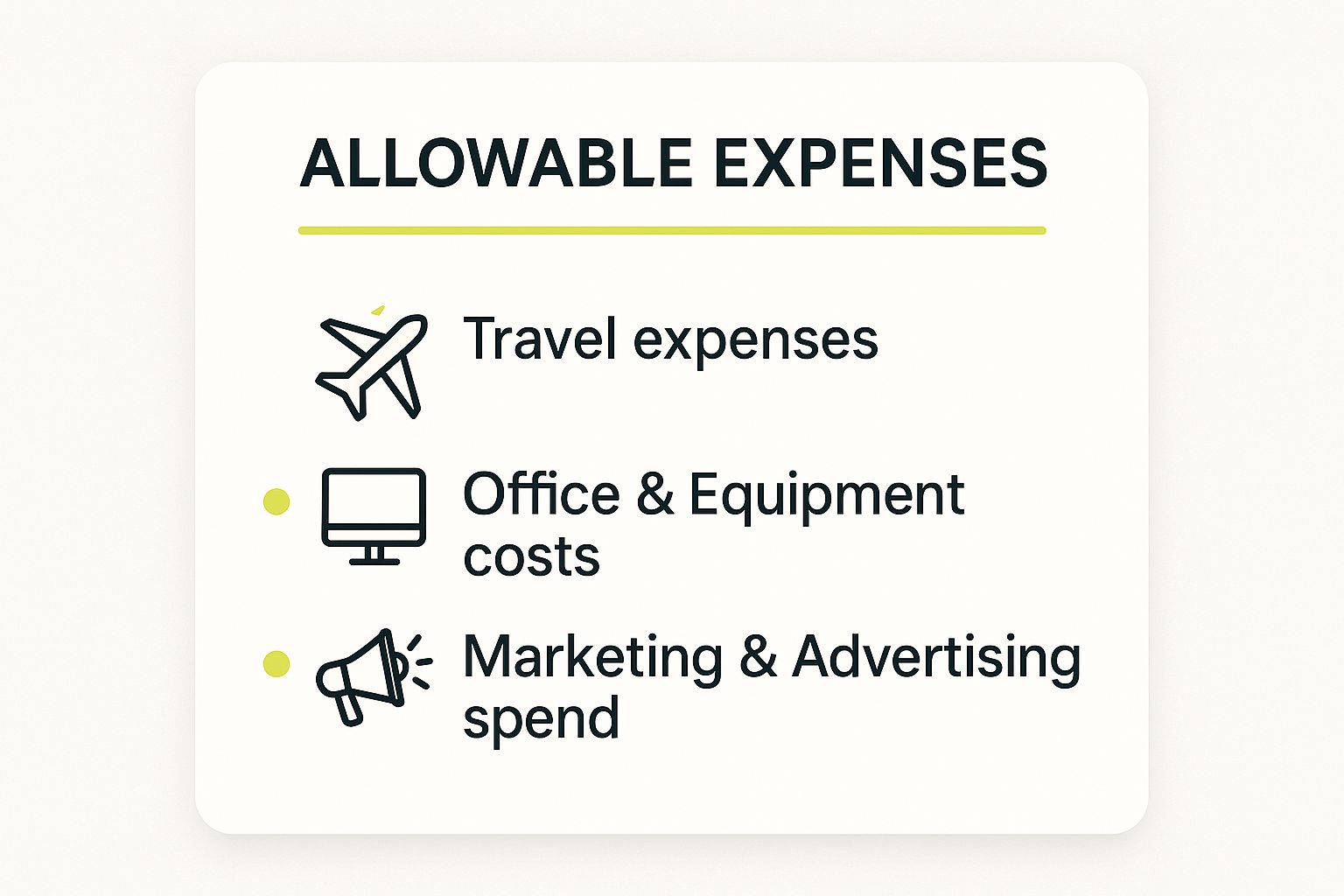
When you run a limited company, every pound you spend on the business can potentially lower your tax bill. These are your claimable expenses, and understanding them is one of the most powerful tools you have for improving your company's financial health.
Think of it this way: the fuel you put in a company delivery van is obviously a business cost. But what about the fuel for your personal car on a weekend trip? That’s not. Getting this distinction right is what turns managing expenses from a chore into a smart way to save money.
At the heart of every single claimable expense is one crucial test set by HM Revenue & Customs (HMRC): the ‘wholly and exclusively’ rule. This is the bedrock principle for figuring out what you can and can't deduct from your profits before calculating your tax.
It simply means the cost must be solely for the purpose of your trade or business.
This isn't just about ticking boxes for HMRC. When you correctly claim for things like office costs, travel, or professional fees, you directly reduce your Corporation Tax. For many businesses, this can add up to thousands of pounds in savings every year, freeing up cash flow that you can reinvest back into the company.
So, where do most businesses find these savings? This image gives you a quick snapshot of the three most common areas: travel, office costs, and marketing spend.

As you can see, these are core operational costs that are essential to keeping your business running. As long as they meet that 'wholly and exclusively' test, they're generally allowable.
For a lot of company directors, the real challenge is keeping on top of identifying and recording these costs throughout the year. It can feel a bit overwhelming, but it doesn’t have to be. Getting the right professional support can make sure you never miss out on a legitimate claim.
You can explore how our dedicated company accounts services help streamline this entire process, keeping you compliant and as tax-efficient as possible.
To give you a clearer picture, it helps to see a few examples side-by-side. The table below provides a high-level summary of common expense categories and whether they are typically allowable for a limited company.
This isn't an exhaustive list, of course, but it highlights the importance of that 'wholly and exclusively' rule. Getting it wrong can lead to penalties, but getting it right means more money stays in your business.
Okay, so we've got the "wholly and exclusively" rule down. Now, let's get practical and see how it applies to the real world. Think of your business expenses as a toolbox – each tool has a specific job, and knowing which one to use makes your life a lot easier. This section will break down the most common expenses for a limited company, helping you spot every legitimate cost that keeps your business ticking over.

We'll move beyond the abstract rules and into day-to-day scenarios. By walking through these categories, you’ll gain the confidence to track costs properly and make sure you're not leaving any tax savings on the table.
Whether you’re in a swanky rented office or working from the spare room, your workspace costs are fundamental business expenses. These are the bricks and mortar (sometimes literally!) that give your business a place to operate.
If you have a commercial property, it's pretty straightforward. Your monthly rent, business rates, and utility bills like electricity, gas, and water are all fully deductible. Simple. It’s the cost of keeping the lights on.
Things get a little different when you work from home, as so many directors do now. You can claim a proportion of your household running costs.
It's vital to be fair and reasonable with your home office calculations. While you can claim for the running costs, you can't claim for a portion of your mortgage interest or council tax through your limited company. HMRC sees these as personal liabilities.
Business travel is another big area for claiming expenses, but the rules can be picky. The key thing to remember is that the travel must be to a temporary workplace, not your daily commute to your permanent office.
For instance, that train ticket to visit a client in Manchester? That's a valid business expense. The hotel you stay in overnight and the meals you have while you're there are also claimable.
Here are some common travel costs that generally get the green light:
A good rule of thumb is to ask yourself: "If I wasn't making this trip for my business, would I have spent this money?" If the answer is no, it's almost certainly a legitimate expense. Just be sure to keep all your receipts and tickets as proof.
You have to spend money to make money, and luckily, the costs of growing and protecting your business are tax-deductible. This category covers everything you spend to promote your business and get expert help.
Marketing expenses are all about attracting customers and building your brand. This could be anything from a Google Ads campaign to printing new business cards.
Professional fees, on the other hand, are what you pay for specialist services your business needs to operate properly and stay on the right side of the law. Think payments to your accountant for doing your year-end accounts, or a solicitor for drafting a contract. These are allowable because they're essential for the management of your company.
Common examples you'll see in this category include:
Claiming these expenses for a limited company ensures your investments in growth and compliance are as tax-efficient as they can be, which directly helps your bottom line.
For most businesses, your team is your biggest investment. It makes sense, then, that people costs are often one of your largest operational expenses. Getting your head around how to correctly claim everything from staff salaries to freelancer fees is vital for keeping your limited company’s tax bill in check.

Just how much of an impact do labour costs have? Well, according to the Office for National Statistics, a massive 46% of trading businesses with 10 or more employees pointed to rising labour costs as a key reason for hiking their prices. This stat really drives home how crucial it is to manage your wage bill smartly – it directly affects your profitability and pricing.
It probably goes without saying that the salaries you pay your employees are a primary deductible expense. But it’s not just about the monthly paycheque. The good news is that a whole host of related costs also count as being "wholly and exclusively" for the business, meaning you can claim them, too.
These allowable costs include:
It’s also worth mentioning benefits in kind, like company cars or private health insurance. These are claimable, but they’re a different kettle of fish. They have their own tax treatment and usually mean extra National Insurance contributions and paperwork (hello, P11D form).
Juggling all of this can feel like a lot. Making sure your staff costs are structured properly is as much about staying compliant as it is about being tax-efficient. Our team can help you get this right, so have a look at our guide on managing your company's payroll effectively.
Bringing in subcontractors or freelancers can give your business a real injection of flexibility, but the rules for claiming these payments need a bit of care and attention. Paying a genuine contractor for a specific project is absolutely a legitimate business expense. The tricky part is making sure their employment status is correctly defined.
HMRC is laser-focused on the difference between a genuinely self-employed contractor and what they call a 'disguised employee'. Get this wrong, and your company could be on the hook for a hefty tax and NI bill. This whole area is governed by the off-payroll working rules, better known as IR35.
When you hire a freelancer, you need to be certain that your contract and your day-to-day working relationship scream "business-to-business". This typically means they have control over how they complete the work, use their own equipment, and are free to work for other clients. Keeping meticulous records of contracts, invoices, and payments isn't just good practice; it's non-negotiable proof that these are valid business expenses.
Some of your most important business expenses won't be about flashy marketing or new equipment. They’ll be about something far less exciting, but arguably more critical: protection.
Investing in the right insurance policies and professional advice is what safeguards your business from the unexpected. Thankfully, HMRC gets this. They see these costs as essential for your day-to-day operations, which means they’re fully tax-deductible.
Think of business insurance as a safety net. It's a cost you pay hoping you'll never actually need to use it, but having it in place is just good, responsible business practice. And the best part? It's a tax-efficient way to protect your company.
Any insurance policy taken out purely to protect your business is an allowable expense. It passes the 'wholly and exclusively' test with flying colours because its entire purpose is to serve the business.
Common types of claimable business insurance include:
It might seem obvious, but a shocking number of businesses operate without this basic protection. SMEs make up 99.9% of all businesses in the UK, but various studies have shown that around 44% don't have any commercial insurance at all. Even more worryingly, up to half of those who do have cover are underinsured, leaving them dangerously exposed. You can find out more about the UK business landscape and insurance trends on Money.co.uk.
Just as insurance protects you from disaster, getting proper professional advice protects you from making expensive mistakes. The money you spend on experts like accountants, solicitors, or specialist consultants is an allowable expense.
These services aren't luxuries; they are fundamental to staying compliant and making smart, strategic decisions. Paying an accountant to handle your tax returns or a solicitor to check over a contract are textbook examples of costs incurred 'wholly and exclusively' for the business.
HMRC knows you can't be an expert in everything. That's why fees for services like bookkeeping, legal advice, or business consultancy are viewed as necessary operational costs.
By claiming these fees, you're not just getting top-tier advice; you're also lowering your tax bill while building your company on a solid, compliant foundation. It’s a clear win-win for any limited company director.
Claiming for business expenses is one thing, but being able to prove them is everything. A claim without a receipt is just a number on a form, and as far as HMRC is concerned, that simply won't fly. Building a solid record-keeping system isn't about creating pointless admin; it's about building a bulletproof defence for every single deduction you make, ensuring your expenses for a limited company are always compliant.

Think of your records as the foundation of your financial house. If the foundation is weak, the whole structure is at risk if HMRC ever decides to inspect. A strong system, on the other hand, makes your year-end accounting smooth and completely stress-free.
The golden rule is simple: you must keep all your business records for at least six years from the end of the last company financial year they relate to. This covers everything that supports your accounts and tax returns.
So, what does HMRC actually want to see? Your records need to tell the full story of each transaction. They should paint a crystal-clear picture of what you spent, when you spent it, and why it was necessary for your business.
A basic checklist for every single expense should include:
Keeping meticulous records is non-negotiable. Without them, you don't just risk having genuine expenses disallowed—you could also face hefty penalties for inaccurate tax returns. It's the ultimate proof that your claims are legitimate.
Gone are the days of stuffing faded receipts into a shoebox. While you can still keep paper copies, modern digital tools offer a far smarter and more efficient way to manage your records.
Cloud accounting software can automate huge chunks of this process. You can just snap a photo of a receipt with your phone, and the software often uses Optical Character Recognition (OCR) to pull out the key details and categorise the expense for you. It saves countless hours and massively reduces the chance of human error. If you're looking for support in this area, our expert bookkeeping services can get you set up with a streamlined digital system.
To make sure you're capturing everything HMRC needs, it helps to have a checklist. The table below breaks down the essential details every expense record should contain.
Getting this right for every transaction is the key to maintaining clean, compliant books that will stand up to any scrutiny. It’s a habit that pays for itself many times over.
Figuring out the expense rules for a limited company can feel like walking a tightrope, but most of the expensive falls happen because of a few common tripwires. Once you know where they are, they’re surprisingly easy to step around, keeping your company safe from penalties and making sure you claim every penny you’re entitled to.
One of the most common traps people fall into is the ‘duality of purpose’ rule. This is where an expense has a foot in both the business and personal camps. Think about buying a sharp new suit you wear for client meetings but also to your mate's wedding. That’s a classic example. HMRC will throw the whole claim out because the expense wasn't exclusively for business.
Another frequent slip-up is simply mixing up personal and business spending. It seems harmless to pay for the weekly big shop on the company debit card, fully intending to pay it back, but it creates a real headache for your accounts. It blurs the lines and can end up being treated as a director's loan, which brings a whole new level of tax complications.
The secret is to keep things separate and play by the rules consistently. This isn't just about ticking boxes for HMRC; it’s about building strong financial habits that will serve your business well in the long run. For a deeper dive into getting your finances structured properly, have a look at our essential tax advice for small businesses.
Here are a few 'do this, not that' pointers for some of the trickiest areas:
Client Entertainment:
Home Office Costs:
The best defence against making a mistake is to aim for total clarity. If an expense genuinely has a dual purpose, the safest bet is to either not claim it at all, or get professional advice on whether it can be correctly apportioned. This approach keeps your books clean and leaves you with nothing to worry about if HMRC ever comes knocking.
When you're running a limited company, the rules around expenses can feel a bit murky. Let's clear things up by tackling some of the questions we hear from company directors every single day.
You've got two main routes here.
The simplest is to claim HMRC's flat rate of £6 per week (or £26 a month). The beauty of this is its simplicity – you don't need to dig out utility bills or do any complicated sums.
Alternatively, if your costs are higher, you can calculate the business portion of your actual household expenses. This involves working out what percentage of your home is used for work and applying that to costs like heating and electricity. It's more effort, but it can be worth it.
This is one that catches a lot of people out. In nearly every case, the answer from HMRC is a firm no.
While taking a client out for lunch is a perfectly legitimate business activity, you unfortunately can't deduct that spending to reduce your Corporation Tax bill.
If you're using your personal car for business trips, you can claim an allowance. HMRC lets you claim 45p per mile for the first 10,000 business miles in a tax year, and 25p per mile after that.
The key here is to keep a meticulous mileage log, detailing each journey's date, purpose, and distance. It's an absolute must for your records. And as your business grows, getting to grips with things like the VAT registration threshold will also become vital.
At GenTax Accountants, our job is to make the complex world of tax simple, so you can get back to what you do best. To see how our friendly, expert accounting services can free up your time and boost your bottom line, pop over to https://www.gentax.uk.